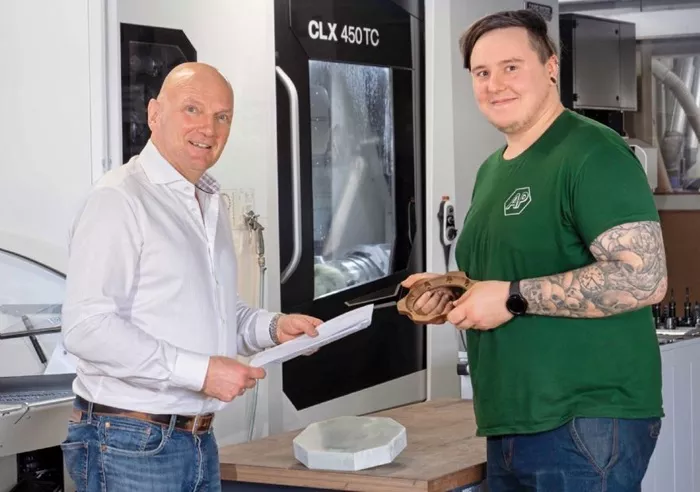Since 2005, German subcontractor Ament Plastics GmbH has specialized in producing complex precision parts from technical plastics. The company mainly works on individual pieces and small series for clients in the automotive, medical, and aerospace sectors. About 70% of their production involves thermosetting plastics, which are known to be difficult to machine.
In 2022, to improve efficiency, Ament Plastics invested in a CLX 450 TC twin-spindle turn-milling centre from DMG Mori. This investment was part of a plan to expand capacity and optimize processes. The new machine can turn, mill, and drill parts all in one setup. This means components are fully machined on six sides during a single visit to the machine. As a result, the company reduced production time, improved quality, and gained more flexibility.
Machining thermosetting plastics is more challenging than machining thermoplastics, which the company also processes. Klaus Ament, founder and CEO, explained the difference: “Thermoplastics produce normal chips when machined. Thermosetting plastics, however, create dust that must be flushed away. This dust forms an aggressive slurry. In some applications, like electrical engineering, we cannot use coolant because the material absorbs moisture. Therefore, the dust has to be extracted.”
He added that laminated thermosets consist of layers made from materials such as hard paper, cotton fabric, or epoxy glass fiber. Epoxy glass fiber, introduced in the mid-20th century, is especially abrasive. This requires harder tools for machining. Every type of plastic has its own specific machining requirements. Ament’s skilled engineers carefully consider these parameters during production.
Today, Ament Plastics uses five-axis machining centres and modern CNC turning machines with driven tools as standard equipment for working with these materials. Erik Fleischmann, the company’s production manager, said: “Previously, we needed at least two machines and had to reclamp parts several times. This process was slow, tied up machines, and reduced accuracy. Investing in the CLX 450 TC was a big step forward for us.”
The CLX 450 TC was chosen partly because of its compact size, which fits the limited space available in Ament’s Wernberg-Köblitz workshop. With travel ranges of 750 mm (X-axis), 200 mm (Y-axis), and 1,100 mm (Z-axis), the machine can produce many different types of components. It features a counter spindle and a compact turn-mill tool spindle, making it versatile for single-setup production.
The machine is equipped with a Breuning IRCO bar loader and a container for finished parts. This allows for unattended production during the night. When needed, in-process measurement can be added. This feature helps monitor quality continuously during series production, reducing the time needed for later inspections.
Klaus Ament concluded: “Working with technical plastics is interesting but finding skilled machine operators and trainees is a big challenge. Because of this, full machining and high process integration will continue to be important factors in our future equipment investments.”

